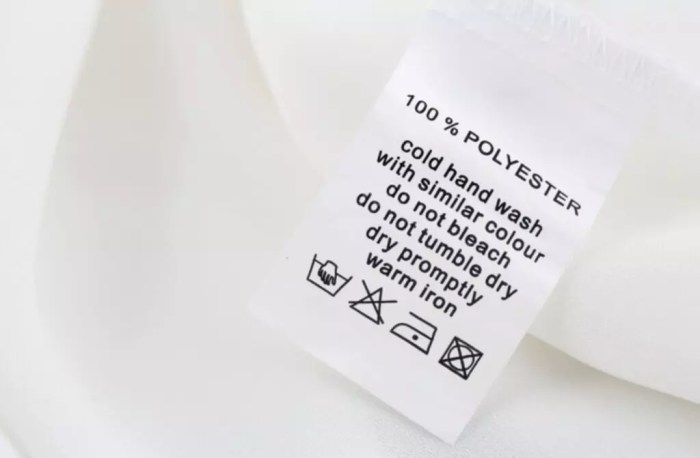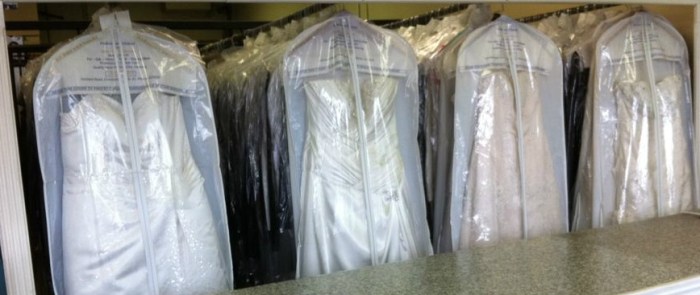Understanding Wedding Dress Fabrics
Can you dry clean a wedding dress – Choosing the right cleaning method for your wedding dress hinges on understanding its fabric composition. Different fabrics react differently to various cleaning processes, and some are far more delicate than others. This section will explore the properties of common wedding dress fabrics and their suitability for dry cleaning, highlighting potential risks involved.
Fabric Properties and Dry Cleaning Suitability
The delicate nature of many wedding dress fabrics necessitates careful consideration before cleaning. Silk, for instance, is luxurious but prone to damage with harsh chemicals. Satin, while beautiful, can easily crease and show watermarks. Lace, with its intricate detailing, requires gentle handling. Tulle, though relatively durable, can be susceptible to snagging.
Understanding these properties helps in selecting the appropriate cleaning method.
Potential Dry Cleaning Risks by Fabric Type
Improper dry cleaning can lead to various problems depending on the fabric. Shrinkage, discoloration, damage to delicate embellishments, and even irreversible fabric damage are all potential risks. The choice of solvent and the cleaning process itself play crucial roles in minimizing these risks.
Fabric Cleaning Comparison
| Fabric Type | Dry Clean Suitability | Potential Damage | Cleaning Recommendations |
|---|---|---|---|
| Silk | Generally Suitable, but requires specialized care | Shrinkage, discoloration, watermarks | Professional dry cleaning using a gentle solvent; avoid harsh chemicals. |
| Satin | Generally Suitable | Creasing, watermarks, discoloration | Professional dry cleaning; press carefully after cleaning. |
| Lace | Requires specialized care | Snagging, tearing, discoloration | Professional dry cleaning by a specialist experienced with delicate fabrics. |
| Tulle | Generally Suitable | Snagging, tearing | Professional dry cleaning; handle with care to prevent snagging. |
| Organza | Generally Suitable | Shrinkage, tearing | Professional dry cleaning using a gentle solvent. |
Dry Cleaning Processes and Methods
Understanding the dry cleaning process is essential for making informed decisions about your wedding dress. This section details the standard process and compares different methods, focusing on best practices for handling delicate embellishments.
Standard Dry Cleaning Process
The standard dry cleaning process typically involves several steps: inspection for stains and damage, pre-treatment of stains, cleaning in a specialized solvent, rinsing to remove the solvent, drying, and pressing. The specific details may vary slightly depending on the dry cleaner and the fabric of the dress.
Dry Cleaning Method Comparison
Traditional solvent cleaning uses perchloroethylene (PERC) or other hydrocarbon solvents. Wet cleaning, on the other hand, uses water-based solutions. Wet cleaning is often gentler on delicate fabrics but requires specialized expertise to prevent damage.
Handling Delicate Embellishments

Source: officialroyalwedding2011.org
Beading, sequins, and embroidery require extra care during dry cleaning. The dry cleaner should use gentle handling techniques and appropriate solvents to avoid damage or loss of embellishments. Pre-cleaning inspection and communication with the cleaner are key.
Wedding Dress Preparation for Dry Cleaning
- Inspect the dress thoroughly for any stains or damage before taking it to the cleaner.
- Carefully remove any loose debris or dirt from the dress.
- Gently brush the dress to remove surface dust and debris.
- Wrap the dress in acid-free tissue paper to protect it during transport.
- Place the dress in a garment bag or protective case.
Alternatives to Dry Cleaning: Can You Dry Clean A Wedding Dress
While dry cleaning is often the preferred method for wedding dresses, alternative cleaning methods exist, each with its own advantages and disadvantages. This section will explore these alternatives and Artikel situations where they are most appropriate.
Alternative Cleaning Methods: Pros and Cons

Source: weebly.com
Hand washing offers a gentle approach but requires significant time and care and may not be suitable for all fabrics or stains. Spot cleaning addresses specific stains but might not clean the entire dress effectively. Each method has its place depending on the dress and the level of soiling.
Situations Favoring Alternative Methods
For minor stains or very delicate fabrics, spot cleaning or hand washing might be preferable to dry cleaning. However, for heavily soiled dresses or those with intricate embellishments, professional dry cleaning is generally recommended.
Situations Requiring Dry Cleaning
Dry cleaning is generally necessary for heavily soiled dresses, dresses with complex embellishments, or dresses made from fabrics that are unsuitable for hand washing or spot cleaning. It is the safest method for removing stubborn stains and preserving the overall condition of the dress.
Cleaning Method Decision Flowchart
A flowchart would visually guide the decision-making process, starting with assessing the level of soiling and the fabric type, leading to the most suitable cleaning method (dry cleaning, hand washing, spot cleaning, or no cleaning needed).
Identifying Reputable Dry Cleaners
Choosing the right dry cleaner is crucial for preserving your wedding dress. This section Artikels key factors to consider when selecting a dry cleaner specializing in wedding gown cleaning.
Factors to Consider When Choosing a Dry Cleaner
Look for a dry cleaner with experience in handling delicate fabrics and wedding gowns. Check online reviews and ask for references. Inquire about their cleaning methods, insurance policies, and guarantees.
Finding a Wedding Gown Specialist, Can you dry clean a wedding dress
Search online for dry cleaners specializing in wedding dress cleaning. Check for certifications or affiliations with professional cleaning organizations. Word-of-mouth recommendations from friends or family can also be helpful.
Questions to Ask Potential Dry Cleaners
- What is your experience cleaning wedding dresses?
- What cleaning methods do you use?
- Do you have insurance to cover damage?
- What is your guarantee policy?
- Can I see examples of your previous work?
Importance of Insurance and Guarantees
Reputable dry cleaners should offer insurance to cover accidental damage and provide guarantees on their work. This protects you in case of unforeseen problems during the cleaning process.
Post-Cleaning Care and Storage
Proper handling and storage after dry cleaning are essential for maintaining your wedding dress’s condition. This section provides guidelines for long-term storage and addressing potential post-cleaning issues.
Handling After Dry Cleaning
Inspect the dress immediately after receiving it from the cleaner to check for any damage or imperfections. Handle it carefully to avoid creasing or snagging.
Importance of Proper Storage
Proper storage prevents damage from light, dust, and pests. A cool, dry, and dark place is ideal. Using acid-free tissue paper and a breathable garment bag further protects the dress.
Long-Term Storage Tips
- Store the dress in a cool, dark, and dry place.
- Use an acid-free tissue paper to wrap the dress.
- Place the dress in a breathable garment bag.
- Avoid storing the dress in plastic bags, as this can trap moisture and cause damage.
- Consider professional archival storage for long-term preservation.
Addressing Post-Cleaning Issues
If you notice any stains or discoloration after cleaning, contact the dry cleaner immediately. Address minor issues promptly to prevent them from becoming more serious problems.
Illustrative Examples of Wedding Dress Cleaning Outcomes
This section provides illustrative examples of how different cleaning methods affect various wedding dress fabrics, showcasing both positive and negative outcomes. These examples are for illustrative purposes only and should not be considered exhaustive.
Positive Cleaning Outcomes
A silk wedding dress, professionally dry cleaned using a gentle solvent, retained its color and shape, with minimal shrinkage. A satin gown, cleaned using a similar method, showed no creasing or watermarks. A lace dress, handled with expertise, avoided snagging or damage to its intricate details.
Negative Cleaning Outcomes

Source: ecomuch.com
Deciding whether you can dry clean a wedding dress often depends on the fabric. For instance, delicate materials might require specialized cleaning. The overall look you’re aiming for, including accessories like a stunning a line wedding dress veil , should also influence your cleaning decisions. Ultimately, the best approach for cleaning your wedding dress is to consult a professional dry cleaner experienced in handling bridal wear.
They can assess the fabric and recommend the safest cleaning method.
A tulle dress, improperly cleaned, experienced significant snagging. A delicate silk gown, subjected to harsh chemicals, suffered discoloration. A beaded gown, poorly handled, lost several beads during the cleaning process. These scenarios highlight the importance of choosing the right cleaner and method.
FAQ Summary
Can I dry clean a vintage wedding dress?
Vintage dresses often require specialized care. Consult a professional dry cleaner experienced with delicate and antique fabrics before attempting any cleaning.
How much does it cost to dry clean a wedding dress?
Costs vary significantly based on the dress’s size, fabric, embellishments, and the dry cleaner’s location and expertise. Expect to pay several hundred dollars.
What if my wedding dress has stains?
Point out any stains to the dry cleaner before cleaning. Some stains may require pre-treatment or specialized cleaning techniques.
How long does it take to dry clean a wedding dress?
The process typically takes several weeks, allowing for careful handling and thorough cleaning.